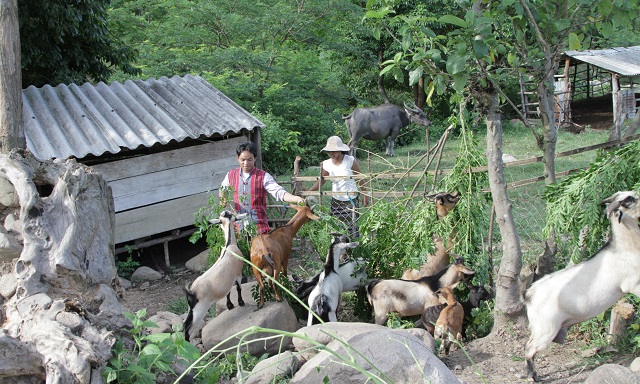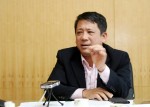Ethnic minorities: escaping poverty via credit policies
Changing perceptions, changing lives
Ho Ai Can, who belongs to the Van Kieu ethnic group in Pa Loang, Huong Hiep commune, Dakrong district, in Quang Tri province, and his family have once lived in poor conditions and great difficulties. Yet after going through ups and downs over the years, his household has turned into a rather wealthy one in the village.
Starting off with purely VND30 million ($1,363) borrowed from the preferential credit programme for the poor back in 2009, Can’s family took the initiative to invest in forest plantation and livestock. Thanks to hard work, he and his wife were able to make a profit. By mid-2015, after paying off his loan in full, he was eligible to apply for an additional loan of VND50 million ($2,272) from a credit programme for the almost-poor, which he then spent on six pregnant cows.
 |
| Thanks to the preferential credit programme, Ho Ai Can and his family gained access to the funds they needed for farming |
Over time, Can and his family have extended their farm to raise more goats and chickens. “Up to this point, our herd of cattle has reached 40, bringing us a profit of VND60-70 million ($2,727-$3,181) a year. We have thus been able to carry out with other projects, renovate our house, and take care of our children,” said Can.
Dakrong is known to be one of the poorest districts of Quang Tri, with up to 80 per cent of the population from ethnic minorities. According to deputy chairwoman of the district (Dakrong district) Ho Thi Kim Cuc, Dakrong currently has the highest number of poor households, being the victims of low levels of education, backward cultural practices, high fertility rate, and the mindset of “the more children the merrier.”
The preferential funds available from Vietnam Bank for Social Policy (VBSP) have arrived to help the poor in their great difficulty.
The deputy chairwoman of Dakrong said, “In conjunction with paving the credit stream to each and every village, the policy bank officers have worked with local authorities to assist all households from applying to loans to disbursement and so on. Small and big tasks as they’ve (done), they have indeed helped the locals in starting off their businesses, investing in production and manufacturing, and reducing reliance on nature works (collecting wood or picking ripe fruits in the woods). We call this a ‘great revolution’ that changes the perceptions of local villagers.”
Preferential credit reaching almost all ethnic households
According to VBSP, the credit programme for ethnic minority households began in 2007 and in the past 10 years, the policy bank has made it possible for ethnic families to get the financial support they need in a convenient and sufficient manner.
To date, the loan programmes have dedicated over VND2.9 trillion ($131,81 million) to ethnic groups, with more than VND2 trillion ($90.9 million) in outstanding loans on record with some VND845 billion ($38.4 million) having been repaid. Some 208,000 households have had outstanding loans with VBSP, with the average loan reported at VN8.4 million ($381).
Given the credit programme, the ethnic communities have gained a chance to invest in production and family business, helping them enhance their living and escape poverty. What is more, through investment and production, they have improved the level of management and manufacturing, as well as the management of capital over time—a long-term impact that helps raise awareness, confidence, and gradually boost their status in society.
For this achievement, VBSP had been giving priority to lending to the poor and ethnic groups in rural, remote, and isolated areas, and those in great difficulty, close to the borders or on the islands. They are all able to get access to the government’s preferential loan programme to obtain a chance at a better life and business.
The simple method and lending procedures, together with the wide coverage of the preferential credit programme through nearly 200,000 savings and credit units and some 11,000 commune transaction units nationwide, have helped poor households access loans in line with their financial capacities and repayment ability. The programme has changed the standard of living at many families, contributing to fighting poverty and ensuring sustainable growth and social security.
Do Van Chien, Minister and Chairman of the Committee for Ethnic Minority Affairs, noted that almost 100 per cent of ethnic households in communes, villages or remote areas have gained access to the preferential funds.
The funds have proven their vitality in lending a helping hand to those in need to realise their dreams of a small business, introducing them to market mechanisms. Thanks to this credit programme, the black credit market or high-interest rate loans have also been reduced.
| VBSP celebrates 15th anniversary Vietnam Bank of Social Policies has enjoyed a successful 2017, celebrating its 15th anniversary. Nguyen Van Ly, deputy CEO of the bank, shared with Ha An his thoughts about this milestone and the bank’s future strategy. |
| Developing in step with rural youth The preferential credit programme of Vietnam Bank for Social Policies has given millions of young people a helping hand to continue with their studies, improving their economic conditions and rising up to prosper. |
| Streamlining preferential credit flows to those in need In a quest to assist the poor and those longing to access preferential credit programmes from the government, Vietnam Bank for Social Policies has set up operations at the commune level, with transaction points located at the communal people’s committees, to provide convenient and efficient funding for those in need. |
| Binh Thuan province combats poverty with microfinance Over the years, farmers in Binh Thuan province have made good use of microcredit to build a better life for themselves. |
What the stars mean:
★ Poor ★ ★ Promising ★★★ Good ★★★★ Very good ★★★★★ Exceptional
Latest News
More News
- Cashless payments hit 28 times GDP in 2025 (February 04, 2026 | 18:09)
- SSIAM and DBJ launch Japan Vietnam Capital Fund (February 04, 2026 | 15:57)
- Banks target stronger profits, credit growth in 2026 (February 04, 2026 | 15:43)
- Vietnam on path to investment-grade rating (February 03, 2026 | 13:07)
- Consumer finance sector posts sharp profit growth (February 03, 2026 | 13:05)
- Insurance market building the next chapter of protection (February 02, 2026 | 11:16)
- NAB Innovation Centre underscores Vietnam’s appeal for tech investment (January 30, 2026 | 11:16)
- Vietnam strengthens public debt management with World Bank and IMF (January 30, 2026 | 11:00)
- Corporate bond market poised for stronger growth cycle (January 28, 2026 | 17:13)
- Vietnam's IPO market on recovery trajectory (January 28, 2026 | 17:04)




















 Mobile Version
Mobile Version